Do we live in a simulation? This is one of those questions which has kept at least part of humanity awake at night, and which has led to a number of successful books and movies being made on the subject, topped perhaps by the blockbuster movie The Matrix. Yet the traditional interpretation of the ‘simulated universe’ thought experiment is one in which we – including our brains and bodies – are just data zipping about in a hyper-advanced simulation rather than physical brains jacked into a computer. This simulation would have been set up by (presumably) a hyper-advanced species who seem to like to run their own version of The Sims on a Universe-sized scale.
Regardless of the ‘why’, the aspect of this question where at least some scientific inquiry is possible concerns whether or not it would be possible to distinguish anything uniquely simulation-like in our environment that’d give the game away, like a sudden feeling of déjà vu in the world of The Matrix where you can suddenly perceive the fabric of the simulation. However, the major problem which we have to consider when trying to catch a simulation in the act is that to this point we cannot ourselves create even a miniature galaxy and intelligent beings inside it to provide a testable hypothesis.
Beyond popular media like movies and series like Rick & Morty, what do science and philosophy have to say about this oddly controversial subject? According to some, we have already found the smoking gun, while others are decidedly more skeptical.
Define ‘Simulation’
Part of the trick in proving whether or not we exist solely inside a simulation is to try and define this state and its properties. Presumably it’d mean that everything which we can observe, experience and apply reasoning skills to is ultimately the result of some input from a previous state, with a kind of clock setting the pace for the next universal update. From these transitions we could conceivably deduce the algorithms which underlie the simulation and unravel its secrets.
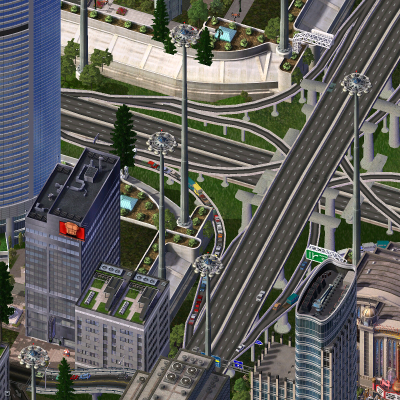
BigBang.exe). Here the Universe is thus an unimaginably large analog computer, capable of keeping track of every aspect of space-time down to sub-Planck lengths. What, then, is the difference between the Universe and a presumed artificial universe?
The risk is that by trying to quantify some aspect of the laws of physics or the like as being ‘absolute proof’ or even just evidence of this Universe’s simulation-ness, it loses sight of our own ignorance regarding the observable Universe and the properties thereof. Even so, what is decidedly just a thought experiment has taken on a life of its own in the Simulation Hypothesis, with proponents espousing it mostly because it ‘feels right’. Yet this is a point where ancient philosophical concepts such as for example the concept of maya in Indian philosophies serve to remind us of how little of these contemplations are new or original.
Meaning ‘illusion’ or ‘magic’, maya usually describes the idea that something may appear to be really what we think it is, yet upon closer inspection it turns out to be completely different. A good example here is that of when our imagination runs wild: say that we think we just saw something in the dark, something that could be a snake, an intruder or something equally threatening that kicks our fight-or-flight response into high gear. Yet when the dark is replaced with light, we see that the snake was a rope, and the intruder just a jacket tossed over a piece of furniture.
In this context, it only takes a child to realize that humans are very good at recognizing patterns and things which are in fact not there, if only because that’s how we’re neurologically wired – such as with face recognition – or all too often due to wishful thinking-turned-real when we really want something to be true. This raises the point of when is what we think we perceive real, and when is it merely another illusion?
Evidence Of Absence
One of the core aspects of the scientific method is that it is impossible to prove the absence of evidence, often illustrated by examples along the lines of Russell’s Teapot. Call it a mere axiom, but the fact remains that it is not possible to prove absolutely and beyond question that there is no tiny teapot in orbit between the Sun and Mars, nor that traveling faster than the speed of light is impossible, nor that we exist only inside a computer system that’d be so far beyond our understanding and possibly our physical reality that we couldn’t possibly begin to comprehend it.
It remains theoretically possible that any of these things could be true, even with significant evidence of absence on the side of these being false. Hence the agnostic position is logically the appropriate position to assume in such matters, lest one falls into either the trap of blindly arguing for evidence of absence in lieu of being open to further evidence, or to fall for the logical fallacy of arguing from ignorance. Even so, to keep matters reasonable, concepts such as Occam’s Razor are liberally employed to settle for the most likely truth.
Within all of this context, it is therefore interesting to read a number of recent publications by an associate professor of physics at the University of Portsmouth, including this most recent one by this Prof. Melvin M. Vopson in AIP Advances on how the ‘second law of infodynamics’ provides strong evidence that we live in a simulated universe.
Statistics And Other Illusions
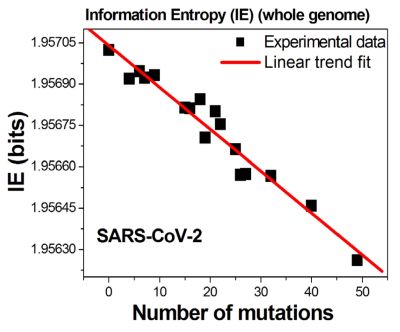
As a quick scroll through Prof. Vopson’s paper is likely to have one’s mind reeling with unanswered questions within the first few paragraphs, it’s perhaps a good idea to start at the beginning. This would appear to be a May 2022 paper published in Applied Sciences by Vopson as sole author with the title: “A Possible Information Entropic Law of Genetic Mutations”. This is a riveting read that seeks to overthrow essentially everything we think we know about how mutations in genetic material work and what their effect is, challenging the fundaments of Darwinism.
The basis for these rather strong claims is found in the application of Shannon entropy (information entropy, or IE) on the recorded genome samples of the SARS-CoV-2 virus as it evolved during the first two years of its spread across the globe. Information entropy is effectively the definition of uncertainty within a set of information, whether it’s a string of characters or genetic material. The lower the uncertainty, the lower the number of bits needed to encode this information. Here Vopson claims to have found a strong correlation between the number of mutations the viral genome underwent and the effect on the genome’s IE, postulating that this must mean that genetic mutations aren’t random, but always serve to reduce the IE of the genome.
Next, in July of 2022 a follow-up research paper was published in AIP Advances titled: “Second law of information dynamics”, in which Vopson and a colleague (S. Lepadatu) try to formalize this ‘law’, setting it up as essentially the inverse of the second law of thermodynamics, which dictates that the entropy of a system will always increase, as the Universe inevitably expands towards its (presumed) heat death. This ‘second law of infodynamics’ thus states that the entropy of a system will remain constant or decrease. At this point the very fundament of physics has been essentially rewritten, and we are still only in the second act of this peculiar play.
Final Act
The aforementioned 2023 paper published in AIP Advances by Vopson can be regarded as the penultimate triumph of this new ‘law of information dynamics’, as here it is applied to not just a viral genome, but to the electron shells that surround atoms. Drawing in both the Pauli exclusion principle and Hund’s rule of maximum multiplicity, it is argued that when at equilibrium in the ground state, these electrons occupy the shells according to this rule to minimize their information entropy, and thus that this way the fewest bits are needed to encode it, which would save space if this happened to be a simulated universe.
Unfortunately, the 2004 discovery by Slipchenko et al. reported in Angewendte Chemie that 5-Dehydro-1,3-quinodimethane does not follow Hund’s first rule would seem to already violate this presumed ‘second law of infodynamics’. As the remainder of the paper seems to go off on various tangents regarding adiabatic energy exchanges of the Universe and the ‘problematic’ entropy budget of the same – before pointing at many things in the Universe being symmetrical as some kind of evidence of simulated data – it’s left as an exercise to the reader to perhaps make some sense of it.
Although I personally feel that Sabine Hossenfelder’s take on the simulated universe thought experiment is somewhat crude and dismissive, I do agree with the notion that it’s rather presumptive of a Type 0 civilization – that has to predict the weather using a simulated weather model that’s more a rough approximation of the underlying physics – to somehow also be an expert on how such detailed simulations which we are currently incapable of would work or look, whether from the in- or outside.
No matter what you think of the possibility that we are all being all simulated bits of data, or disembodied brains bobbing gently in nourishing fluids, we can likely never fully dismiss it, even if it’s so unlikely that it should remain what it is: a thought experiment to be tinkered with now and then, if only because the cool media and books that sometimes appear due to it.

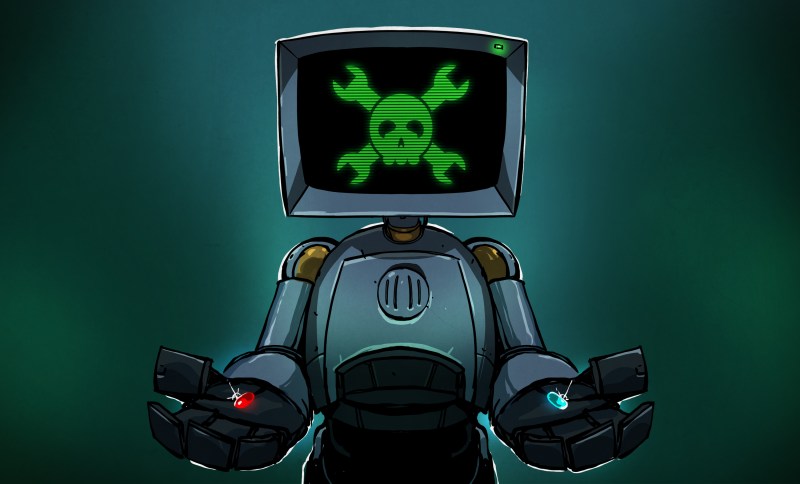





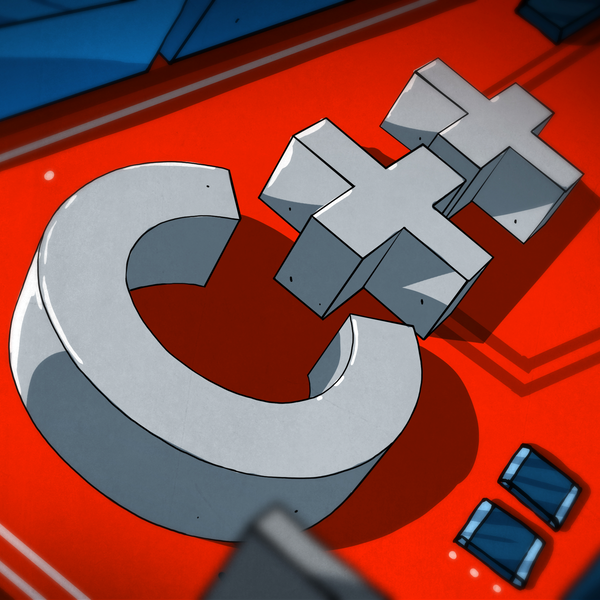



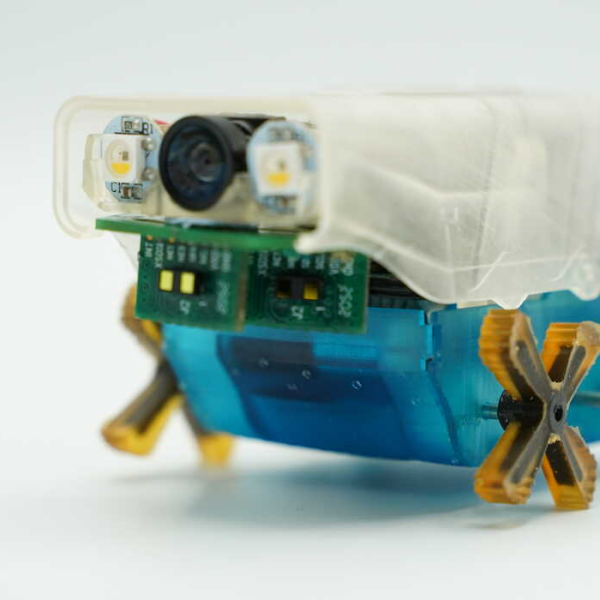





“At this point the very fundament of physics has been essentially rewritten, and we are still only in the second act of this peculiar play.”
Yeah, uh. No. Did you actually read the paper you linked to? Quoting from it:
“This new law of infodynamics must not violate the second law of thermodynamics, so the entropy reduction in the information states must be compensated by an entropy increase in the physical states, via a dissipation mechanism.”
The entire point is that the amount of (digital) information contained within a system *decreases* over time *because of* the second law of thermodynamics. You start off with lots of digital information, and the physical entropy is low, and over time the physical entropy increases and the digital information is lost. This is obvious when you think about it – if you store information magnetically, over time the order you impose when you write information goes away and that increases the physical entropy.
The biological component is more interesting, but it’s the same overall effect. Importantly, they’re only looking at *one kind* of mutation – the equivalent of “single-bit errors” (SNPs), so it’s not *that* surprising – SNPs can’t just pop a new protein out, they basically only work if they’re benign (as opposed to insertions/deletions). It’s not like you’re talking about the virus’s genome changing *in isolation*.
This isn’t some “our universe is totally different!” thing.
I always thought that finally it would show that the smallest bit of information would be equal of some energy amount. Now, this.
And it’s logical, that if something has high entropy, then there would be no information, as information is in order in some way, so it must have low entropy.
No, that’s not right. Information is entropy, not order.
The example they’re giving with magnetic recording is obvious to the point of silly. In any medium, there’s a finite amount of information you can store. If you take that medium and encode *your* information… and then let the *universe* mess around with it however it wants, over time, the amount of *your* information left will decrease.
High entropy means *tons* of information. It just might not be the information you *want*.
“Do we live in a simulation?”
Kind of like the multiverse. At some point it just doesn’t matter. Both are inaccessible to those in it.
The thing with the multiverse is that if multiple universes exist, it is typically assumed infinite universes exist. And If infinite universes exist, then each of those universes have an infinite number of alternates. Therefore there are an infinite number of infinite universes. There logically must exist a universe in which we are all made of cheese. Also, a universe where we are not made of cheese. Even infinite cheese and not cheese universes. However, opposites annihilate. As such the infinite number of cheese universes and infinite number of not cheese universes probabilities cancel each other out into nothingness. Ergo, we are forced to conclude that all of the infinitely possible universes have collapsed against each other canceling out, and this universe is comprised if the tiny inconsistencies, the little wibbles of inconsequential meaningless differences that do not have an infinite alternate to cancel against.
I propose we exist as the irreconcilable left overs of an infinite number of infinite universes collapsing what might have been and could never be into what just is.
Be good to each other kids 😉
>nor that traveling faster than the speed of light is impossible
Moving faster than the speed of light would violate causality, making the question of “traveling” physically meaninless. Perhaps you can, but it won’t look like you’re moving anywhere.
Traveling faster than the speed of light is easy. I can get you from Earth to Alpha Centauri in however short a time you want, if you’ve got enough energy.
It’s getting the rest of the Universe to agree that’s the problem.
Unless “god” pulls the curtains back and reveals everything, there’s no observation that can prove or even suggest that the universe is simulated because every conceivable way the universe works ultimately looks like a computer program regardless of the fact.
How else could it be? Magic?
“Unless “god” pulls the curtains back and reveals everything, there’s no observation that can prove or even suggest that the universe is simulated”
It depends on how you actually phrase the points. If you say “our universe is simulated in SOME_OTHER place” that’s a pointless statement – you have no way to prove or disprove that because you don’t know the laws involved. (Frank Wilczek noted this issue two years ago).
However, some of the suggestions have been stricter than that: they’ve suggested that eventually *we* could reach the point where *we* could generate a simulation *of our own* reality. Which means the “are we living in a simulation” theory is actually “are we living in a simulation inside a universe with identical laws.”
And *that* suggestion is falsifiable.
The latter case reduces to the first.
An observer within a simulation wouldn’t know the true laws of the universe anyways – just what are apparent within the simulation. That the two should be identical is not possible to test without stepping outside of the simulation, which is patently impossible for the observer.
So unless the stars suddenly align to read “You’re living in a simulation, cheers from the scientist of the real universe.”, we have no way of knowing.
“An observer within a simulation wouldn’t know the true laws of the universe anyways”
It’s an assumption. That’s literally the point. Bostrom’s argument for it depends on it. You’re talking about something else.
And then, take Mach’s principle: if the local laws of physics are dependent on the large scale structure of the universe, then you can never write a simulator that is exactly like our reality, because it would have to contain everything about our reality in it and thus wouldn’t fit inside it.
“And then, take Mach’s principle: if the local laws of physics are dependent on the large scale structure of the universe”
That is *not* how Mach’s principle in any theory that’s backed up by observation works, and the coupling of what you’re describing has been restricted by experiment to extremely small values. That’s not to say that coupling is not true, but there’s no evidence for what you’re saying.
Many versions of cosmology have the initial spectrum of quantum fluctuations (pre-inflation) being white. Therefore the specific “realization” of the Universe we see is just one alternative: we could therefore “simulate” an alternative realization, which would correspond to a Universe that’s *disjoint* from ours thanks to inflation. Mach’s principle has no effect on this unless you bring in alternative theories which have in general been failures.
We can prove it when we reach a level in advancedness.
Other thing : who said that if we are living in a simulation, which is exactly identical of the real world? Maybe our physics i a coarse grained one. Maybe in the real world, light speed is different. And so on.
None of it is falsifiable unless some mystical programmer from outside comes in and says “you’re in a simulation.” There’s no point where we create a simulation and can know whether the laws of our universe are the same in the parent universe or not. If we are simulated, we are bound by the rules that govern is in the same way we can’t know things “outside” of our universe, because we are bound by that. It’s ultimately the same thing — discovering the laws of physics or the rules of our simulation, and we can’t differentiate between them, because we are embedded in it and a product of it.
Even the original simulation argument is just a probabilistic one (and not a very well formulated one, but it works for fun). It boils down to something like “IF we create a simulation of our reality, we probably live in a simulated universe ourselves.”
There are no other arguments that have any merit, because of our perspective. It would take an act of “god” to answer this question. It’s a fun question for teens and potheads to think about, but there is nothing serious here.
“and can know whether the laws of our universe are the same in the parent universe or not.”
It’s. An. Assumption. Asking “do we live in a simulation” is different than “do we live in a simulation of our universe inside an identical universe?”
The first is a pointless question, the second is not, because it can be reworded as “can we simulate our own universe perfectly.”
That is not an equivalent rewording of the second question. It’s not a corollary to it at all, hence why the original simulation hypothesis was presented as it was. No amount of simulating that we do can ever prove out anything about any potential laws of physics in a parent universe that is simulating ours. It’s easy to reason out why. The most we can get is that “it’s probable we live in a simulated universe” which is very hand wavey anyways, but it at least is a reasonable idea. It gets considerably worse when trying to write some statement of probability about the rules governing the parent universe — it just doesn’t work.
Without access to the parent universe, we simply can’t know whether it’s the same or not. And it. being. an. assumption. Doesn’t make it a worthwhile thing to assume nor does it lead us to any kind of falsifiable statement without “divine intervention” involved.
Both questions are ultimately pointless, even if a fun thing to think about once.
The second is disproved by the statement. If we cannot simulate our own universe perfectly, we cannot be living in a simulation inside of an identical universe. That’s why I said it’s equivalent: falsifying one falsifies the other. (It’s true you can’t *prove* the rewording, but you can disprove it.)
I don’t know why people keep mentioning “laws of the parent universe.” If you allow them to be different, it’s a pointless question. If you allow them to be the *same*, it isn’t.
If you’re thinking “wait, how could we ever prove we can’t simulate our own universe,” keep in mind there are aspects of the physics of our own universe that are decoupled from “us” and it’s possible to imagine a situation where it’s impossible to actually discover them.
To say that we live in a simulation implies a material universe outside of ours, and then you run into issues of infinite regressive chains of material universes, which is the same as the turtles all the way down argument. I think the closest and most abstract conception you can have of reality is that it is made out of information itself, this is the most abstract you can get, but of course, the map is not the territory. But to go any further than this just delves into metaphysics and is outside the bounds of scientific reasoning, given the nature of science as observational within this reality.
Why does it have to be a material universe outside of ours? If pure energy is the other realm, maybe anything physical is a ‘simulation’.
So is this what Douglas Adams was on about? 42 is probably the answer.
This is the most profound insight here! Food for thought…
Energy and mass are equivalent, the simulation theory implies there is something “outside” this universe running calculations that lead to our mass-energy universe. It’s not falsifiable, leads to no mathematical models we can use to better understand our reality and should be discarded as an unscientific theory.
“the simulation theory implies there is something “outside” this universe running calculations”
No, that’s only true if you don’t word the theory strictly, which is common for *most* theories: for instance, your ‘energy and mass are equivalent’ is actually wrong if you take it as you worded it (no, you cannot blindly convert random mass into nothing but energy and vice versa) but the vague notion has validity.
“It’s not falsifiable”
Versions of it are.
Then “simulation” doesn’t actually mean anything. A good philosophical argument doesn’t end with “the terms being used are therefore meaningless.”
From a total layman’s perspective, who is surely getting the science all wrong, I tend to think of quantum physics as being our discovery of the bits and bytes in the computer simulation. For example, like if the characters in sim city noticed that they are made of pixels. They would realise that what they thought was continuous is actually made of tiny particles that have quantised states, and those particles pop in and out of existence in baffling ways.
The way I see it, any simulation of a universe that is complex enough to create a complete working universe is in itself to all intents and purposes, a completely ‘real’ universe.
The ‘substrate’ that universe runs on is essentially irrelevant.
That is to say, death and taxes will still apply to us all whether we discover this universe is real or a videogame.
This. It’s the very picture of useless naval gazing unless there’s a “so what.” We’re still left with cogito ergo sum and a shitload of question marks.
So one of the guys who pushes this (Bostrom) basically argues that the reason for believing is essentially anthropic, as in “eventually humans will be so advanced we will be able to simulate the past perfectly” and then handwaving to say “so it’s likely we are the simulation.”
Personally, I think that’s completely insane and not worth thinking about: but the very basic question of “can we simulate our *own* universe in a way that the simulation’s results are indistinguishable” could be an interesting question. Most people tend to assume that it’s “yes” and there’s no fundamental reason to believe that.
Close! Bostrom’s argument is more like “if we are able to simulate our universe, it demonstrates that universes can be simulated and thus it is unlikely that we’re the first ones to do so, since in a chain of simulated universes, there’s a much smaller chance we’re the first than some subsequent group to do so.”
There are important details in his paper to indicate that it might not even be possible to do so, or that it might be that civilization never advances that far because of a potential “great filter” and some other things I don’t recall.
Now, this isn’t some grand argument. We’re not likely to be in any given single state in the chain of simulated universes compared to the rest, but at least the only one of those states that qualifies as “not simulated” is the first, so it’s also not some terrible armchair style argument.
But then it also ignores issues like a computer not being able to perfectly simulate itself in a system where more than the computer exists and it needs to be simulated. Something to do with compressible strings and total states. I think you even get some weird kind of infinite recursion because in order to perfectly simulated the universe the computer needs to simulate itself simulating the universe which contains itself simulating the universe which contains itself… and so on. How is this possibly computed?
Yeah, I was simplifying it a bit: it’s not really a great paper, as with most anthropic-like arguments. The point that I was trying to stress is that there *is* a kernel of an interesting question there, but you really need to limit it.
“because in order to perfectly simulated the universe the computer needs to simulate itself simulating the universe”
Yes, this is part of the point. Again, portions of this argument are essentially adapted or truncated arguments – but for instance, you don’t have to necessarily simulate the *entire* Universe, since our effective Universe is finite (inflation and accelerated expansion naturally limit our observable and future Universe). You have to simulate enough of the Universe to get to a similar anthropic state.
So the “wait, is there infinite recursion??” isn’t actually right – so long as you can demonstrate that *our* finite observable Universe has enough computability to simulate another (possibly smaller in the 4D sense) Universe of equivalent capability, that’s fine. Obviously that *would* imply an eventual limit (since the simulated Universe would have less computability, its simulated Universe would have less, etc. etc.)
That’s another aspect of the overall (reframed) question which is interesting, and another way to falsify it – if, for instance, it’s impossible to construct a smaller – in 4D sense – Universe with the same laws, everything breaks again. And if that argument seems impossible, keep in mind the size of *our* Universe is governed by fundamental physics, and if those are shown to be natural (and not arbitrary) then you *can’t* embed another Universe in this one, and you’re done.
One test you can run, is to run a quantum TRNG and check for periodicity or statistical artifacts. It only covers specific cases of simulation, but it’s the best test I’ve thought of to date.
So far, I haven’t detected a simulation.
If it is a dumb simulation that may work. But if the simulation is smart enough to know you are on to it it will find a way to fool you.
Since nobody has mentioned it, there are Darwinian reasons for the SARS-CoV-2 virus to reduce it’s information entropy: replication time. The amount of time required for replication means the virus becomes contagious from the host faster. Spreading faster is definitely high on the list of survival traits for viruses.
“there are Darwinian reasons for the SARS-CoV-2 virus to reduce it’s information entropy”
It doesn’t reason. It just happens due to thermodynamics. It is conserved because a virus has no selective benefit to kill the host only to replicate faster.
i love y’all..
“Nature isn’t classical, dammit, and if you want to make a simulation of nature, you’d better make it quantum mechanical.”
–Richard P. Feynman (who then simplifies this with the following…)
“I think I can safely say that nobody understands quantum mechanics.”— in The Character of Physical Law
Does information have mass? Has somebody taken a SSD, and fill it with zeros, then weigh it very accurately. Then fill it with ones, and weigh it again. Then fill it with random numbers and weigh it again. I wonder what the results would be? I see a HackADay project happening.
“Does information have mass?”
This is the wrong way to think about it: information isn’t a “thing” separate from mass/energy. Information is just entropy – it describes the distribution of *states* of a system. An SSD with all 1s has *exactly the same* amount of information as an SSD with all 0s: zero. The entire system is fully contained in one state, so no entropy/no information.